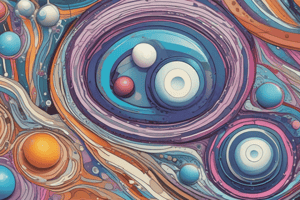Podcast
Questions and Answers
Which type of anesthetic would be most suitable for a patient undergoing a minor surgical procedure?
Which type of anesthetic would be most suitable for a patient undergoing a minor surgical procedure?
- Bupivacaine
- Ketamine
- Lidocaine (correct)
- Propofol
What is the primary mechanism of action for opioids?
What is the primary mechanism of action for opioids?
- Binding to opioid receptors (correct)
- Competitively blocking acetylcholine receptors
- Blocking acetylcholine receptors
- Causing muscle contraction followed by paralysis
Which type of muscle relaxant causes muscle contraction followed by paralysis?
Which type of muscle relaxant causes muscle contraction followed by paralysis?
- Rocuronium
- Vecuronium
- Succinylcholine (correct)
- Neostigmine
What is the primary indication for administering prophylactic antibiotics?
What is the primary indication for administering prophylactic antibiotics?
Which type of medication is used to reduce anxiety and promote relaxation?
Which type of medication is used to reduce anxiety and promote relaxation?
What is the primary use of hormone replacement therapy?
What is the primary use of hormone replacement therapy?
Flashcards are hidden until you start studying
Study Notes
Anesthetics
- General Anesthetics:
- Render patient unconscious and insensitive to pain
- Examples: propofol, etomidate, ketamine
- Local Anesthetics:
- Numb specific area of the body
- Examples: lidocaine, bupivacaine, novocaine
Analgesics
- Opioids:
- Relieve pain by binding to opioid receptors
- Examples: morphine, fentanyl, codeine
- Non-Opioids:
- Relieve pain through non-opioid mechanisms
- Examples: acetaminophen, NSAIDs (e.g. ibuprofen, aspirin)
Muscle Relaxants
- Depolarizing Muscle Relaxants:
- Cause muscle contraction followed by paralysis
- Examples: succinylcholine
- Non-Depolarizing Muscle Relaxants:
- Competitively block acetylcholine receptors
- Examples: rocuronium, vecuronium
Antibiotics
- Prophylactic Antibiotics:
- Administered to prevent surgical site infections
- Examples: cefazolin, cefuroxime
- Therapeutic Antibiotics:
- Administered to treat established infections
- Examples: vancomycin, gentamicin
Anti-Anxiety and Sedatives
- Benzodiazepines:
- Reduce anxiety and promote relaxation
- Examples: midazolam, diazepam
- Other Sedatives:
- Promote relaxation and reduce anxiety
- Examples: chloral hydrate, zolpidem
Hormones and Anti-Hormones
- Hormones:
- Used to replace or supplement natural hormone production
- Examples: insulin, thyroxine
- Anti-Hormones:
- Used to block or reduce hormone production
- Examples: leuprolide, octreotide
Anesthetics
- General anesthetics render patients unconscious and insensitive to pain, with examples including propofol, etomidate, and ketamine
- Local anesthetics numb specific areas of the body, with examples including lidocaine, bupivacaine, and novocaine
Analgesics
- Opioids relieve pain by binding to opioid receptors, with examples including morphine, fentanyl, and codeine
- Non-opioids relieve pain through non-opioid mechanisms, with examples including acetaminophen and NSAIDs like ibuprofen and aspirin
Muscle Relaxants
- Depolarizing muscle relaxants cause muscle contraction followed by paralysis, with an example being succinylcholine
- Non-depolarizing muscle relaxants competitively block acetylcholine receptors, with examples including rocuronium and vecuronium
Antibiotics
- Prophylactic antibiotics are administered to prevent surgical site infections, with examples including cefazolin and cefuroxime
- Therapeutic antibiotics are administered to treat established infections, with examples including vancomycin and gentamicin
Anti-Anxiety and Sedatives
- Benzodiazepines reduce anxiety and promote relaxation, with examples including midazolam and diazepam
- Other sedatives promote relaxation and reduce anxiety, with examples including chloral hydrate and zolpidem
Hormones and Anti-Hormones
- Hormones are used to replace or supplement natural hormone production, with examples including insulin and thyroxine
- Anti-hormones are used to block or reduce hormone production, with examples including leuprolide and octreotide
Studying That Suits You
Use AI to generate personalized quizzes and flashcards to suit your learning preferences.




